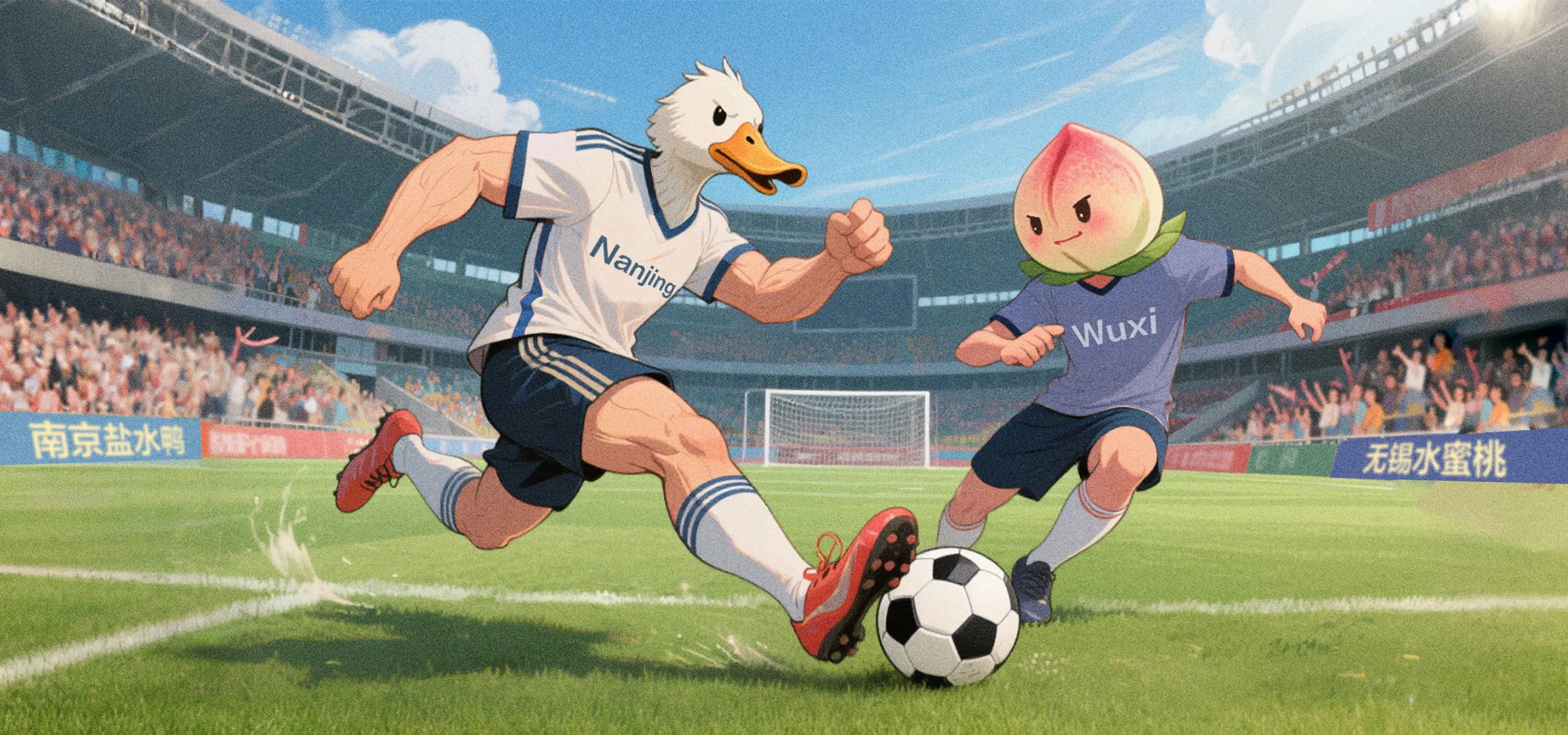A recent amateur football league between Jiangsu’s 13 prefecture-level cities spurred a massive tourist drive in the province—as well as a healthy dose of competition
“Chinese football is saved!” Such was the jubilation expressed by some netizens during the recent inaugural Jiangsu Football City League. Having weathered years of heartbreak in China’s less-than-stellar domestic football environment, dogged by corruption scandals and match-fixing, the provincial grassroots competition provided a glimmer of hope for what Chinese football could be, grabbing massive attention online and sparking excitement across the country.
The amateur competition, which kicked off on May 10, was nicknamed the “Su-per League (苏超 Sūchāo),” a playful abbreviation of the local official league’s name: the Jiangsu Football City League. And as a mark of its popularity, some fixtures drew larger crowds than those of the Chinese Super League. The second round alone attracted over 59,000 fans, with individual matchups like Xuzhou versus Lianyungang and Yancheng versus Huai’an bringing in 22,000 spectators.
The enthusiasm was in part fueled by the league’s inclusive nature, with each of Jiangsu’s 13 prefecture-level cities sending a team to compete. Embracing the spirit of “If you’ve got what it takes, you’re in (你行你上 Nǐ xíng nǐ shàng),” the amateur players spanned from small business owners to college students, and even high schoolers, sparking a football frenzy in the province.
Viewers lauded the competition for its authenticity and fairness:
No match-fixing, no biased referees, just rivalries, every game a derby!
没有假球,没有黑哨,只有恩怨,全是德比!
Fans quickly abandoned their cordiality, even discarding a famous sports motto from the height of Ping-Pong Diplomacy in the 1970s:
Friendship first, competition second!
友谊第一,比赛第二!
Instead, they embraced a harsher creed:
Victory first, friendship fourteenth!
比赛第一,友谊第十四!
In terms of football infrastructure development and established fan bases, regions like Beijing, Shanghai, Liaoning, and Guangdong are home to bigger teams. But the popularity of the “Su-per League” spoke to more fundamental sentiments in the region, becoming a cultural carnival and conjuring Jiangsu’s particular, longstanding inter-city rivalries.
Catch up on trending Chinese sports memes and slang:
- Fake It Like a Football Fan
- A Play-by-Play of Sports Commentary in Chinese
- Talk About the Olympics Like a Champ
When Wuxi, whose citizens are famously sweet-toothed, lost their away game against Taizhou, fans joked about the reason:
They went out of town for the competition, ate unsweetened noodle soup, and ended up with low blood sugar.
他们去外地比赛,吃了不放糖的汤面,低血糖了。
As for Taizhou, they won because of a 主场优势 (zhǔchǎng yōushì, home-field advantage), playing up the fact that it’s Jiangsu’s only prefecture-level city still without a high-speed rail connection:
Every other team had to take the bus there and arrived exhausted.
其他队得坐大巴来,舟车劳顿。
Meanwhile, the match between Xuzhou—hometown of Liu Bang (刘邦), the founding emperor of the Han dynasty (206 BCE – 220 CE)—and Suqian, birthplace of warlord Xiang Yu (项羽), Liu’s arch-nemesis, was hailed as a “reenactment of the banquet at Hongmen (复刻鸿门宴 fùkè Hóngmén yàn),” where Liu famously escaped an assassination attempt by Xiang. Now, a millennium-old rivalry (跨越千年的宿仇 kuàyuè qiānnián de sùchóu) between the two cities has found new life on the scoreboard.
As for the match between Taizhou and Nantong, the rallying cry went:
Win and you get dim sum, lose and you get test papers!
赢了吃早茶,输了做试卷!
It is because Taizhou takes pride in its traditional morning dim sum, while Nantong is renowned nationwide for its academic excellence, as reflected in its usually superlative gaokao, or college entrance exam, results. Known as one of the most competitive exam regions, Nantong has developed a running joke that test papers are its prized “specialty.” Some even say night markets there sell nothing but test papers (南通夜市不卖别的,卖试卷 Nántōng yèshì bú mài bié de, mài shìjuàn).
To outsiders, the intense rivalries began to make it seem like Jiangsu’s citizens had forgotten that they were provincial brethren. The uncompromising feuding could be summed up with the refrain:
No emotional ties, no neighborly love—just a burning desire to win.
没有人情世故,全是对胜利的渴望。
Netizens joked that only Jiangsu could come up with such a brilliant idea, pitting city football teams against each other purely for the spirit of competition. Long been dubbed “散装江苏 (sǎnzhuāng Jiāngsū)” or “loose-packed Jiangsu,” the province is known for its strong, independent city cultures shaped by diverse geography, distinct historical traditions, and varied economic strengths.
Jiangsu stretches north to south across the lower reaches of both the Huai and Yangtze rivers, natural boundaries that have long divided not only daily life but also political powers throughout history. Additionally, the region’s varied climate has fostered a clear cultural divide between northern and southern Jiangsu. Given the distinctive culinary traditions and local dialects across the province, it’s practically impossible to generalize what a Jiangsu person should be like, prompting netizens to conclude:
There’s no such thing as a “typical Jiangsu person.”
天下没有江苏人。
As the second largest economy in China after Guangdong, Jiangsu is also the only province where every prefecture-level city has a GDP exceeding 400 billion yuan. This economic strength has helped nurture a fierce pride across the region, and a healthy dose of competition. Some netizens stoked the conflict, saying:
I heard the city that wins gets to be the provincial capital.
听说赢的城市可以当省会?
Widely known as the “13 Guardians (十三太保 Shísān Tàibǎo),” a term originally referring to the fierce sons of Li Keyong (李克用), a military governor during the late Tang dynasty (618 – 907), Jiangsu’s 13 prefecture-level cities each have their own unique identity, pride, and cultural quirks.
This online frenzy not only sparked a flood of memes and jokes but also translated into a real-world boost for local culinary scenes, tourism growth, and intercity exchange. For example, ahead of a home game in Changzhou, the city offered free admission to its A-level scenic sites for visiting fans from Yangzhou, resulting in over 60,000 visitors flooding the city on game day, with even more tourists arriving during the subsequent Dragon Boat Festival. Meanwhile, the provincial capital Nanjing offered discounts at 30 tourist attractions, 80 restaurants, and 20 shopping malls for anyone with a match ticket.
As the fourth round of the league kicks off on June 14, the “Su-per League” is fast becoming more than just a competition—it’s a unifying force where Jiangsu’s diverse communities come together, rallying behind their cities and embracing a shared identity through football.












